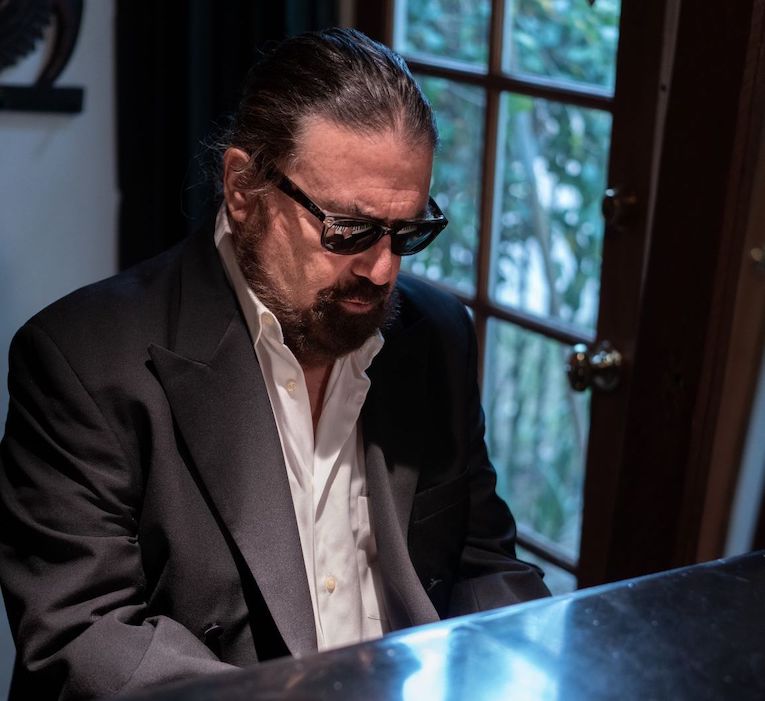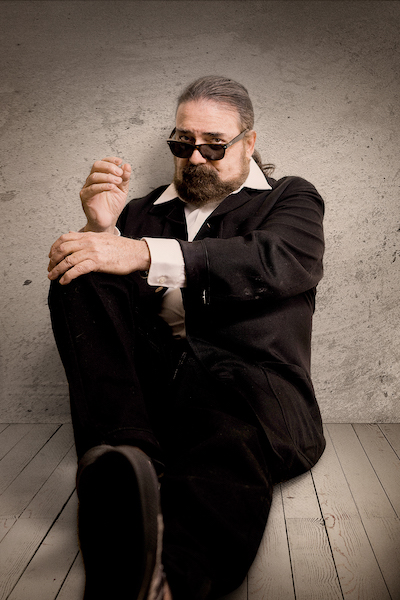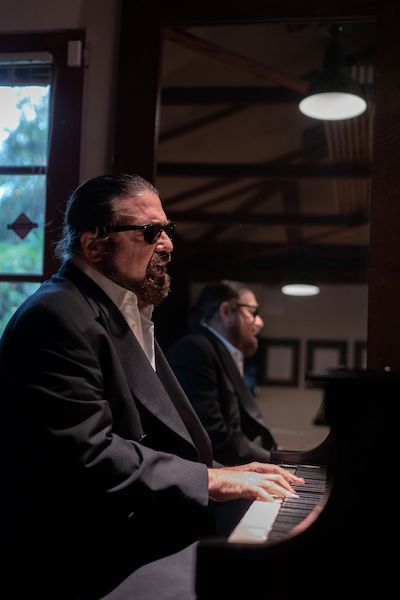
T Bear aka Richard T Bear
By Martine Ehrenclou
After a self-imposed hiatus from the music industry that lasted nearly three decades, T Bear, aka Richard T Bear, keyboardist, vocalist, songwriter, returns with a new album, Fresh Bear Tracks, released April 16, 2021 on Quarto Valley Records. A blend of blues, soul and rock with a who’s who of special guests including Stephen Stills, Robby Krieger, Edgar Winter, Tom Scott, Walter Trout, Hutch Hutchinson, Laurence Juber, and more. Produced by Grammy Award winner Tony Braunagel, Fresh Bear Tracks was recorded at Bobby Krieger’s studio in Los Angeles.
A soulful and distinctive singer, talented keyboardist and songwriter, T Bear (Richard T Bear) made his mark as a solo artist and collaborator with many iconic artists—Crosby, Stills and Nash, The Blues Brothers, Richie Havens, Cher, Paul Shaffer, to name a few. In 1978, T Bear signed with RCA Records and released Red, Hot & Blue that featured Les Dudek, Billy Squier, and the Brecker Brothers. He has shared the stage with Richie Havens, Odetta, The Doobie Brothers and Jeff Beck.
Domestic responsibilities and a struggle to regain his sobriety, which he did in 1983, forced him to put his music career on hold. He became instrumental in developing the Musicians Picnic, serving on its board of directors, which led to the creation of Musicians Assistance Program, now part of MusiCares Foundation. T Bear credits his late wife for encouraging his comeback.
Martine: I loved your album, Fresh Bear Tracks, the songwriting was pretty spectacular.
T Bear: I’m so humbled. Thank you. I really worked hard on that and I have a lot of people to thank. And if the end result is that it moves people, that’s what it’s about.
Martine: There are many different kinds of songs. The lyrics are so visual and soulful, your voice, the band, everything. The album is beautifully done. And I’m not just saying that.
T Bear: Thank you. I think what I accomplished was something that is a little bit different than most people set out to do, in the blues world, or the rock world or whatever world we’re living in. I didn’t want to make a record for one set of folks, maybe it’s kind of goofy to say that, but what I’ve found, since this album has been released, that there’s a song or two or three for everyone that listens to it.
Martine: Tell me what you were going for with the album.
T Bear: Let’s start with how it came about and then I’ll answer any questions you have. If you don’t mind me going back a little way.
Martine: That’s what I’m here for.
T Bear: That’s really nice. I met a woman called Nina and I ended up marrying her. Nina was a huge music lover. There wasn’t a time when I came over to her house that you couldn’t hear music from the street, out from the third floor windows. She knew a lot about music. She’d sit at her desk and study because she went back to school in her 50s and there was a piano on the other side of the desk. I would play and write songs there. We did this mostly every night.
Martine: What a wonderful thing to do with someone you’re in a relationship with.
T Bear: It was seamless, it fit so well. I’d run things by her and she’d ask me questions about Kierkegaard. She said to me at one point, ‘It’s time for you to go out and play, put a band together, play some music.’ I called some friends. Do you know Laurence Juber?
Martine: Not personally, but I know of him, sure.
T Bear: I’ve known Laurence for 40 years. And we used to be in a band together when he was playing in Wings (Paul McCartney and Wings.) I called him up, I called Denny Seiwell who is another member of Wings and Joe Sublett. We put together this band called Root 66. It became T Bear and Root 66. They said, ‘You’re the leader of the band.’ ‘I don’t want to be the leader of the band.’ ‘No, you’re the leader of the band. You write good songs. We’re going to play your songs. It’s your band. You get the gigs, by the way.’
We started playing around town. We played at the Moose Lodge in Santa Monica. When you walk into this place, I swear to you, it’s the set from the ‘Deer Hunter’ bar. That’s exactly what it looks like, with a great stage, lights and sound. We played at Typhoon, then Casa Escobar in Malibu. Then a guy called Bill Lynch called me and said, ‘I’d like you to play at my place called The Write Off Room, and I want to give you a residency there. I hear really great things about you and the boys. And you’re the kind of guy that I’d like to have play here.’ We started playing there. I think it was the best live music club in L.A. at the time.

Nina said to me, ‘It’s time for you to make a record. Go cut some tracks.’ I said to her, ‘Look, nobody’s going to sign me.’ Tony Braunagel was a name she suggested. I agreed. I called him up and said, ‘I really want to cut some tracks. Would you help me?’ He said, ‘Of course I’ll help you.’
I said to Tony, ‘I just got offered Robby Krieger’s studio, and everybody said they would help me because it’s coming out of my pocket.’ I didn’t have any label interest at that time. Everybody worked for the family rate, which is like burritos and a few bucks. A long story short, I went in and cut three tracks. I said to Tony, ‘I want to do this again, I want to do more.’ I wrote my ass off. Then we had a three and a half year sojourn where I cut 23 tracks, 21 originals and everybody that I called said, ‘We’d love to work on your record.’ (Stephen Stills, Edgar Winter, Laurence Juber, Tom Scott, Mike Finnegan, Walter Trout, Lenny Castro, Joe Sublett, Mark Pender, Robby Krieger, and more.)
It was Nina who shoved me out of the nest and said, ‘Fly’.
Martine: What a beautiful thing for her to do. I’m so sorry for your loss.
T Bear: Thank you. She got diagnosed with a very advanced cancer which started in the liver and spread all over. And it was a very fast acting cancer and we didn’t know she had it. It was stage four when they diagnosed it. They gave her four months. I was totally devoted and dedicated to her and took care of her as her caregiver. She lasted not four months but 20 months. Just before she passed, she wrote me a note. It said, ‘Never cancel a gig. Go out and tour. Finish this record. Have a great life and fall in love again.’
Martine: She sounds like a very special woman.
T Bear: An amazing woman. And I loved her like no other. The heartbreak of it is you finally find somebody where everything is just seamless and locks into place and you only have her for a limited amount of time. But the beautiful part of this record is the last song on it, called, “Nina’s Song.”
Martine: It’s a gorgeous song. Incredibly moving.
T Bear: Thank you. I went into the studio the last month before she passed and finished it. I sang it live on Richard Manuel’s piano from The Band. It had those vibes from The Band and him. The album is dedicated to her.
Martine: You said you had 23 songs. Does this mean that you have another album in the works?
T Bear: When we finished everything we had 23 tracks done. We have five more completely mixed and mastered (by Ed Cherney). We have half an album in the can right now. There’s another album that could come out tomorrow. And then during this whole year during Covid, I wrote another album.
Martine: My goodness, talk about prolific.
T Bear: After Nina died, it was a very hard place to stay in because it was so quiet so I’d go to the Write Off Room or Harvelle’s just to hear music and be around people. When Covid hit, I was forced to deal with things. I spent 14 months not going out anywhere. I had my food delivered. I really didn’t go out, like everyone else.
Martine: But you were dealing with intense grief at the same time as the Covid lockdown. That’s a whole different story.
T Bear: Thank God I got clean and sober a long time ago. I’ve got 38 years of sobriety.
Martine: Congratulations. That’s a big accomplishment.
T Bear: Thank you very much. I believe in giving back. I’ve got people that I work with and help if they’re getting newly sober. I helped start The Musicians Picnic.
Martine: Tell me about that.
T Bear: That started many years ago when I got clean and sober. In AA back then, you couldn’t really talk about your gigs or things like that. It was these old AA old guys, and I’m telling you, they were curmudgeons, they were some nasty old bastards. They’d come up to you and go, ‘Hey, kid, principles before personalities. We don’t want to hear about your gig tonight.’ And I say, ‘Well, I don’t want to drink in this bar that I’m going to play in,’ and they say, ‘Then go to a meeting and forget about the gig.’ That kind of stuff.
We started a thing called a Musician’s Meeting where you could share your name, your disease and your instruments. So, I’d go, ‘Hey, my name is T Bear. I’m an addict alcoholic, and I play keyboards.’ And then the next guy would go, ‘Hey, I’m (name of famous musician.) I play harmonica and I’m an addict.’ The original Musicians Meeting was (names of famous musicians). There were 10 or 12 of us. We had this meeting once a week in a house.
We moved it to a little room that a hospital gave us because one of the guys (name of famous musician) worked at this hospital. And people got wind of it. All of a sudden people that wanted to see rock and rollers or stars or people with notoriety started showing up pretending to be sober. Little by little it grew. Then we decided we were going to have a picnic. The first one was in a recording studio. Second one was at the Musicians Institute. And the third one was up in Calamigos Ranch in Malibu.
And by the 10th one, there were 5000 people there. Eric Clapton was our speaker–he’s very open about his sobriety. And a lot of other people that were getting clean and sober. God bless his soul, Mac Rebennack (Dr. John) was playing. The Musicians Meeting Picnic was a clean and sober event. We did it for 25 years. I sat on the board. It started out as raising money for MAP, the Musician’s Assistance Program. MAP morphed into MusiCares and MusiCares is the charitable arm of the Grammys. It takes care of thousands of musicians that need help every year. I work with MusiCares a lot. I love those people.
Martine: Along the way you’ve played, recorded and toured with Crosby, Stills and Nash, Richie Havens, The Blues Brothers and others.

T Bear: Crosby, Stills and Nash was fun because I was playing in Stephen Stills’ band. And he (Stephen Stills) had me come in and play on Southern Cross and it turned out to be a really good record. And then Stephen and I toured, I toured in his band, and we wound up in New Orleans. This is how the song “Give It Up” on the album came about. I forgot about that song 30 something years later. I was going through a shoe box and there were writing demos, and one said, ‘Stills, Give It Up.’ Turned out we wrote it in New Orleans together and forgot about it. I said to Steve (Stephen Stills) ‘You’ve got to play on this.’ He played on it and it’s #1 in the Netherlands the last two weeks.
Martine: Walter Trout played on that song too.
T Bear: Yeah, Walter played on that as well. I love Walter. Walter and I are really good friends. I write songs for him from time to time. I wrote him a song called “The Other Side of the Pillow” for his We’re All In This Together duets album with him and Charlie Musselwhite.
Martine: Tell me about “Bring On the Night,” the first song on Fresh Bear Tracks.
T Bear: I recorded that on my first album called Red, Hot & Blue on RCA. And one of the reasons why I wanted to record it again was Mike Finnegan. Mike Finnegan played on my first album and we were friends then. When I first met Mike, he was working on Electric Ladyland on the Jimi Hendrix sessions.
It was more of a rock and roll song on the first album. I had been playing with Root 66, which has a horn section. The horn section is Joe Sublett, the sax player, who I think you might know, and Mark Pender and Richie ‘LaBamba’ Rosenberg. Those guys, Richie and Mark played in the E Street Band. They were the basic cable horns on the Conan show.
I’ve always liked soul bands. Southside Johnny, Springsteen’s E Street band. “Bring On The Night” I wanted to do a rock and soul horns thing. I thought it was a really good song and it grooves along nicely.
Martine: It sure does. When I was listening to your album, “Bring On the Night” sounded like a great opening number to get the crowd going. You’re performing at The Canyon Club (Agoura Hills, CA) sometime soon aren’t you?
T Bear: June 27th. It’s a Sunday night if you can come out.
Martine: Will do. On your album, is the song “River of Resurrection” about sobriety, hope, rebirth and forgiveness?
T Bear: Yes. It’s all about everybody wants a second chance and there’s a place that we can go. It’s a metaphor. There’s a place that we can go if we’re willing to be open enough to accept a second chance.
Press Here to Listen to “Bring On The Night” feat. Walter Trout
For more information about T Bear and his new album ‘Fresh Bear Tracks’ see his website here.

Leave A Comment